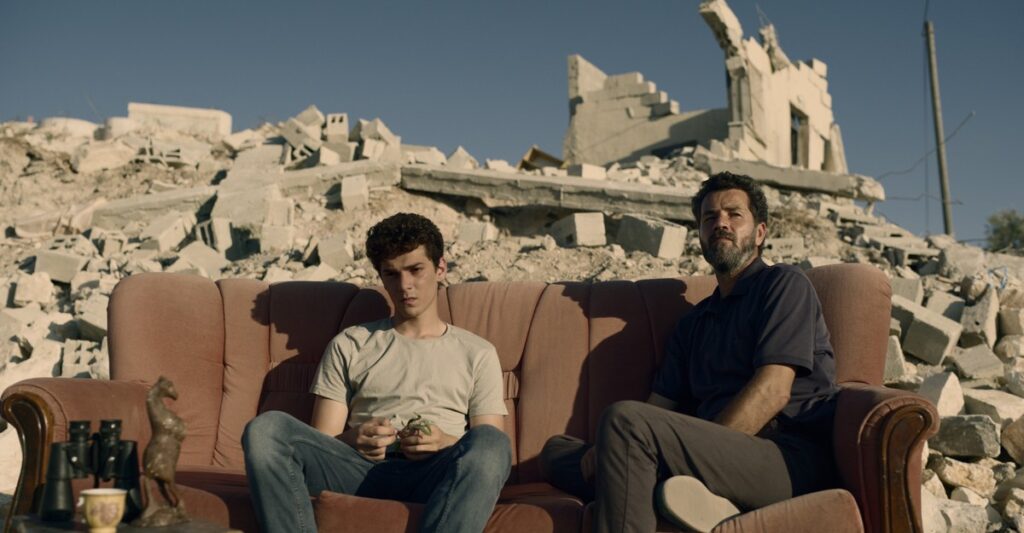At its best, The Teacher captures the intimate horrors of life under harrowing circumstances.
At first glance, the main character of The Teacher, the debut feature film by the Palestinian British writer-director Farah Nabulsi, seems drawn from a familiar inspirational-movie archetype. Basem El-Saleh (played by Saleh Bakri) is an English instructor at an all-boys high school, where a substantial portion of his work involves trying to motivate disaffected students. But The Teacher isn’t just another paean to the democratizing power of education, or the role that a single mentor can play in guiding listless teenagers toward conventional success. On top of all this, Nabulsi’s film spends considerable time fleshing out why school feels like an afterthought for some of Basem’s students: The movie is set in the West Bank, where Israel’s military occupation constrains the most mundane elements of Palestinian life—including what kind of future young people can imagine for themselves and their loved ones.
When The Teacher begins, the soft-spoken teacher, who lives alone, is wrestling with grief on multiple fronts. Slowly, the film reveals that Basem’s teenage son died after suffering an untreated asthma attack in a military prison, where he was serving an eight-year sentence for participating in a protest—one that he’d attended with his father. The agony of his child’s death, and the ensuing rift in Basem’s marriage, still haunts the educator, and as Basem drives along the winding roads of the West Bank, his loneliness seems to fill the screen. So when one of his students, a bright young boy named Adam (Muhammad Abed Elrahman) loses his older brother after a confrontation with settlers, Basem finds himself naturally shifting into a paternal role.
Nabulsi’s film repurposes the educator-turned-father-figure trope, using Basem’s proximity to his student to highlight the senselessness of both characters’ losses. The Teacher, which premiered in September 2023 at the Toronto International Film Festival and is now playing in select U.S. theaters, was inspired in part by the filmmaker’s travels to Palestine, where her parents were born, and where, as she described in an interview, she encountered people with firsthand experience of “cruel and absurd things such as home demolitions, child prisoners in military detention, settler violence and vandalism.” Though the film was shot well before the October 7 attack by Hamas and Israel’s ensuing bombardments of Gaza, its themes may nonetheless feel timely to viewers. At a moment when settler violence against Palestinians in the West Bank is rising, The Teacher, in its best stretches, captures the intimate horrors of life under harrowing circumstances—and the lifesaving power of the relationships that people still manage to forge and nurture.
Much of the film traces Basem’s attempts to stop Adam from trying to avenge his brother’s death—which, as Basem sees it, is a futile mission that would likely end with Adam dying. “After everything you’ve been through, you still believe there’ll be justice?” Adam asks him in an early scene. His tone is incredulous, but the question becomes a sort of guiding principle: Some characters do, in fact, believe that things can be better, despite all evidence otherwise. When the two inadvertently become involved in a plot to secure the release of 1,000 Palestinian prisoners in exchange for one Israeli American soldier, a plotline loosely based on the Gilad Shalit story, Basem’s concern for Adam keeps the teenager from surrendering to the allure of violent resistance. Nothing will bring back their family members, and justice may never come through the courts, but The Teacher shows how Basem and Adam help each other work through pain that once seemed insurmountable.
At moments, The Teacher takes on more than it can handle, such as a romantic subplot between Basem and a British volunteer worker at his school. Early on, Lisa (Imogen Poots) seems intended to serve as a proxy for American and European audiences; she expresses a simple surprise at the conditions of Basem’s teaching environment. As the film progresses, this wide-eyed curiosity shifts to righteous indignation, but these reactions are muddled by her feelings for Basem. In one instance, Lisa is aghast to find a gun in his house, but her anxiety about his involvement with a local resistance group feels no more dramatic than her frustration with Basem’s reticence about the dissolution of his family. Her attempts to connect with Adam also feel forced in comparison to his quietly moving rapport with Basem.
Aside from Basem and Adam’s budding kinship, the most significant relationship in the film is the bond between its Palestinian characters and the land their families have inhabited for generations. Nabulsi depicts the West Bank with romantic vision, lingering on sweeping hillside vistas and peppering vivid memories of the natural world into dialogue. After settlers raze Adam’s family property, the teen is no longer able to see a future for himself in their village, especially without his brother. But growing closer to Basem gives him a window into what the West Bank was like long before he was born. Through Basem’s accounts of his own family history, Adam deepens his connection to the land his brother died trying to defend—and his resolve to avoid meeting a similar fate.
Premium IPTV Experience with line4k
Experience the ultimate entertainment with our premium IPTV service. Watch your favorite channels, movies, and sports events in stunning 4K quality. Enjoy seamless streaming with zero buffering and access to over 10,000+ channels worldwide.

















